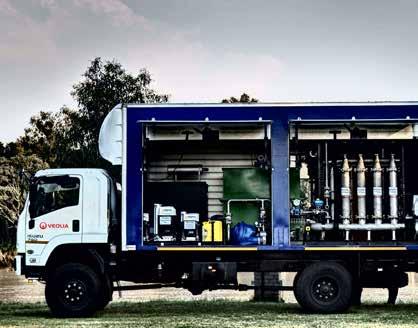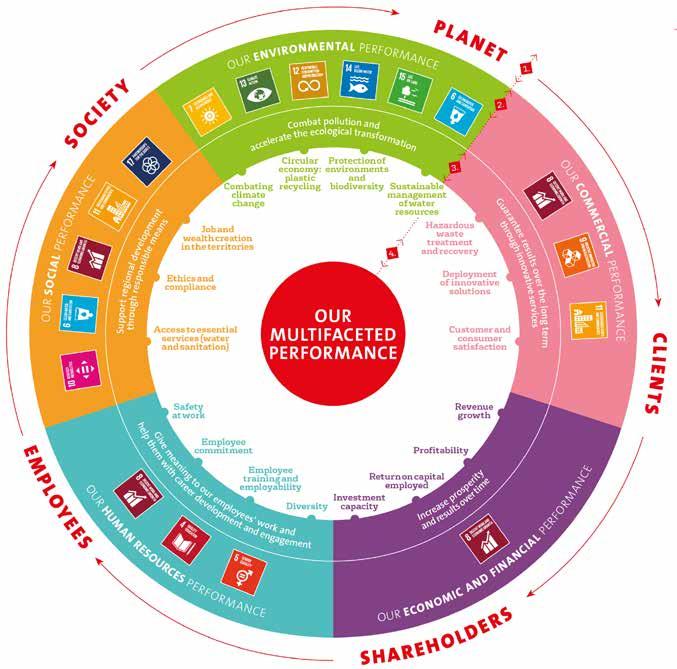
4 minute read
Water, Waste & Energy
LOOKING AFTER THE PLANET
Building the circular economy is an essential component in meeting the UN’s 17 Sustainability Development Goals (SDGs). WASA speaks to Chris Braybrooke, GM: Marketing, Veolia Water Technologies South Africa, about the group’s SDGaligned Impact 2023 Strategy, plus Veolia’s local expansion into the energy and waste segments.
Advertisement
Chris Braybrooke, GM: Marketing, Veolia Water Technologies South Africa
What are the key challenges facing the water sector? CB To start on a positive note, it’s important to state that, for every challenge, there are opportunities for improvement. In Veolia’s case, that philosophy has sustained our growth since 1853; however, the onset of climate change has made modern-day challenges far more complex, and their interventions more urgent.
In South Africa’s case, the poor state of water and sanitation infrastructure adds a further complexity, compounded by declining operations and maintenance (O&M) skills, and shrinking budgets. The unprecedented increase in urbanisation then threatens to overwhelm the capacity of existing water and wastewater treatment works. The increasing risk for rural areas is that they get left even further behind as government places greater priority on addressing urban service backlogs.
Can public-private partnerships (PPPs) help? Definitely. Veolia operates PPPs worldwide and has been instrumental in launching landmark projects. Local examples include our 46 Mℓ/day wastewater reuse plant in partnership with eThekwini Municipality. Here, domestic sewage is converted into industrial water for sale to a paper manufacturer and petrochemical producer. Effectively, we’re taking wastewater and turning it into a value-added product, plus our clients pay less than 50% of the normal water tariff for the treated water. Everyone benefits: Veolia has a successful business enterprise; eThekwini did not have to incur the cost of building and maintaining a potable water treatment plant, since this plant frees up 46 Mℓ/day, which can then be redeployed for communities; and the environment scores from a water reuse perspective.
Another example is our 15-year O&M contract for Overstand Municipality in the Western Cape. The client benefits from the fact that they can plan ahead in terms of financial costs over this period. Veolia also provides ongoing technical training for municipal plant personnel to ensure they keep up to date with Veolia’s vast experience in this environment.
The South African Infrastructure Fund places major emphasis on crowding in private sector investment. PPPs and special-purpose vehicles (SPVs) are an essential part of the solution. The priority now is to accelerate PPP implementation. Currently, it’s not uncommon for a PPP to take five or more years to transition from prefeasibility to actual implementation. We no longer have the luxury of time in responding to the threats of water scarcity, water security and allied environmental pollution. How will Impact 2023 make a difference? The Impact 2023 Strategy refines Veolia’s complete solutions commitment to its stakeholders globally. As group CEO Antoine Frérot stated, “A company is prosperous because it is useful; not the other way around.”
Veolia is an undisputed technology leader. However, Impact 2023 demonstrates that Veolia’s commitment to society is far greater than this. Impact 2023 aligns Veolia’s multifaceted performance model with the UN’s SDGs, against which all Veolia business units are measured in terms of agreed key performance indicators (KPIs). Veolia KPIs are audited annually by external agencies leading up to and including the year 2023.
Prior to Impact 2023, Veolia was already working directly and indirectly in 13 of the 17 SDGs. Now, we are committed to making an impact in these 13 goals. The five segments of the Impact 2023 cycle, or wheel, are environmental, commercial, economic and financial, human resources, and societal performance.
It’s a two-way model, where we apply Impact 2023 to empower our employees to optimise client efficiencies, skills and profit margins.
A mobile potable water purification unit from Veolia

How will Veolia expand its local business to include waste and energy? We’re well known locally as a water and wastewater solutions provider across all industries. Going into 2021, we are now expanding this to include the group’s integrated energy and waste technology suites. These are strongly linked to water use, reuse and conservation.
Veolia recently acquired Dolphin Coast Landfill Management, a hazardous waste facility, where we’ve invested in new technologies. Further opportunities will open up, either via acquisition or growth. In the food and beverage industry, for example, Veolia has designed and commissioned plants globally where organic waste is converted into biogas for applications that include electricity or heat generation. The same principle has been successfully applied in the wastewater segment. Essentially, we create closed circuits that promote resource recycling and advance the circular economy.
In addition to this, Veolia invests in waste recycling programmes through skills development and job creation initiatives. Our participation in the Baobab project in Durban, which includes plastic recycling, is a good example. Here, unemployed community members have been trained to produce saleable products that include PPE and face masks. We’d like to expand this initiative nationally.

Why should the market engage with Veolia? The group has some 350 registered technologies that can be harnessed to build custom-designed or modular, plug-and-play systems. We’ve also invested in digital technologies, like Hubgrade – a remote monitoring management tool that enables plants in all industries to run optimally and extend their lifespan. The advent of Impact 2023 further refines our services and total solutions mandate within the context of the circular economy.
And in closing? The private sector and government are engaging more; however, we need to speed up the process of PPP implementation. Local and international investors are standing by. We just need an enabling environment. That’s Veolia’s philosophy for Impact 2023.










